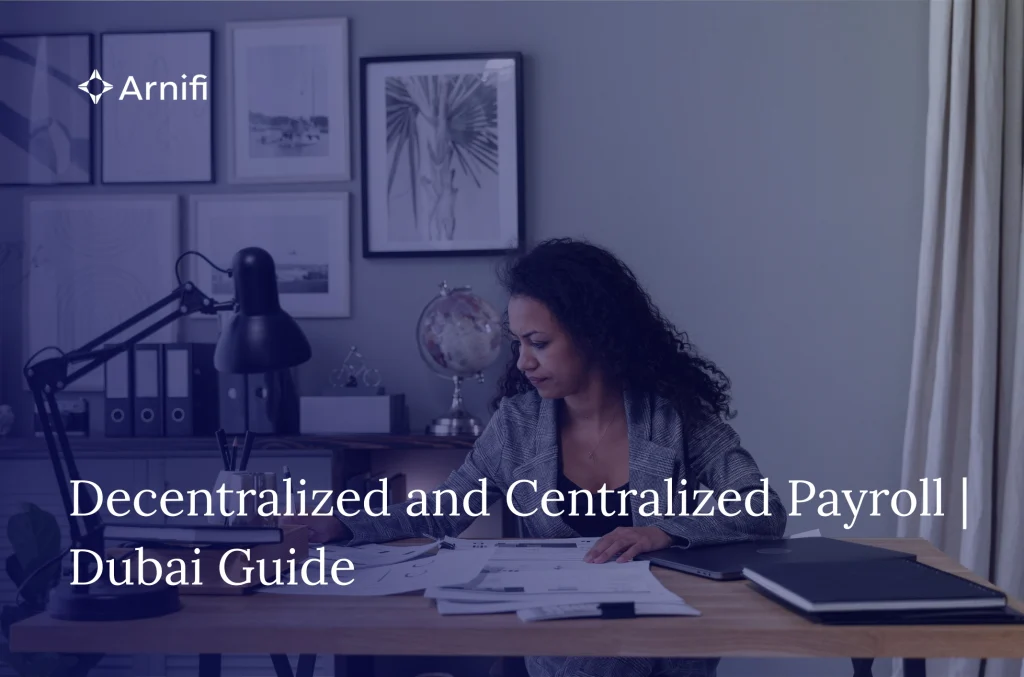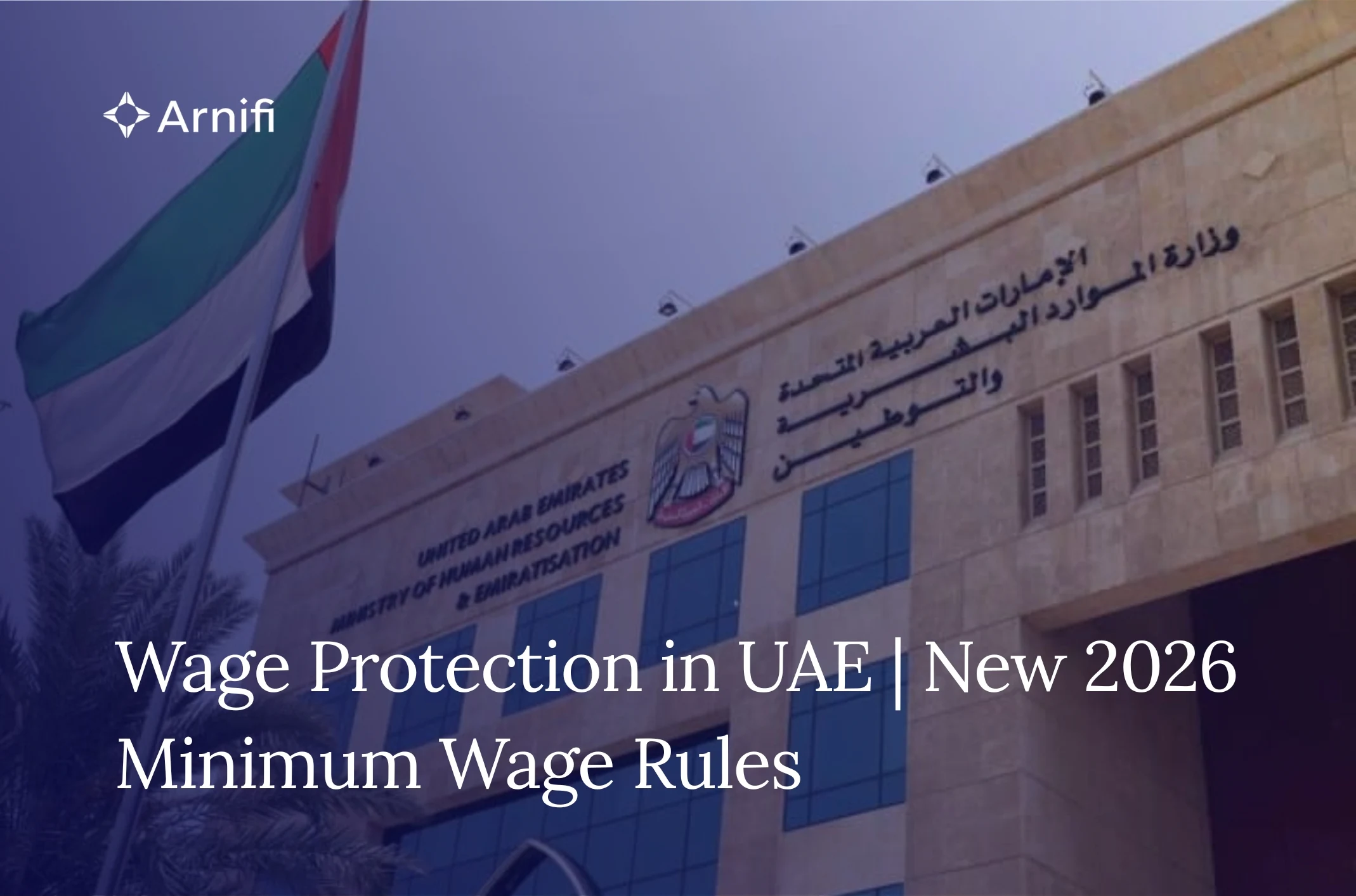Decentralized vs Centralized Payroll | What Works Best for Companies in Dubai?
by
Rifa S Laskar
Nov 18, 2025  6 MIN READ
6 MIN READ

Dubai businesses are rethinking how they run payroll as compliance rules tightens and teams spread across borders, the choice between decentralized and centralized payroll can determine accuracy, cost, and control. Here’s a clear breakdown to help companies decide what fits their structure, growth plans, and compliance load.
Table of contents
- 1. Introduction
- 2. What Centralized Payroll Actually Means
- 3. What Decentralized Payroll Means
- 4. Key Differences | Centralized vs Decentralized Payroll
- 5. The UAE Factor | Why This Debate Matters More in Dubai
- 6. What Most Dubai Businesses Actually Prefer
- 7. How ArnifiHR Bridges the Gap
- 8. Steps to Choose the Right Payroll Model
- 9. FAQs
- 10. Conclusion
1. Introduction
Deciding between decentralized and centralized payroll isn’t a theoretical exercise anymore. When running a business in Dubai, you already feel how payroll is getting more complicated with remote hires, cross-border contractors, WPS timelines also shifting compliance rules, audits, and entity expansions all of it adds up fast.
Here’s the part many teams overlook the way one structure payroll controls the accuracy of the payouts, your compliance exposure, your costs, and how quickly your HR team can move. That’s why more companies are comparing decentralized vs centralized payroll models and trying to figure out which approach actually works in the UAE environment.
2. What Centralized Payroll Actually Means
Centralized payroll is simple to understand basically, instead of multiple payroll systems scattered across departments or locations, everything runs through one unified payroll system with standardized processes and a single oversight team.
Here’s what defines centralized payroll:
One source of truth
A single Dubai payroll system manages all employee data, earnings, deductions, benefits, and compliance tasks.
Standardized workflows
Whether it’s salary processing, overtime rules, leave calculations, or WPS file creation, everything follows one consistent process.
Unified oversight
A core payroll team keeps control. Nothing is left to chance, and errors are easier to catch.
Better compliance
Because everything flows through one system, WPS payroll Dubai requirements, UAE labour law rules, audit trails, and reporting become far easier to maintain.
For Dubai businesses, this model becomes far more attractive as they scale. More employees means more room for mistakes also centralization reduces that risk and makes leadership feel confident that compliance is under control.
This is also the model that most payroll services in Dubai recommend once a business crosses a certain size.
3. What Decentralized Payroll Means
A decentralized payroll model spreads payroll responsibilities across different teams, departments, or regional entities.
Instead of one team and one system, you have:
Multiple payroll systems
Different teams may use different tools for salaries, attendance, benefits, and data.
Local control
Departments or locations manage payroll independently.
Flexibility for local rules
This can make sense for companies operating across several countries with varying regulations.
Where does decentralized payroll work well?
- Large global companies with long-established regional departments
- Multi-entity groups with fully independent operations
- Organizations with country-specific benefits, tax laws, or unique regional payroll policies
- Businesses where speed in each region matters more than central oversight
The structure gives control to each location, but it also creates uneven accuracy and heavy compliance challenges, especially in the UAE, which doesn’t forgive payroll mistakes easily.
4. Key Differences | Centralized vs Decentralized Payroll
Here’s the straightforward comparison companies ask for when evaluating their Dubai payroll structure:
Accuracy- Centralized payroll wins and one system means fewer manual inputs and fewer errors.
Compliance- Centralized payroll in UAE is more reliable, also you avoid inconsistent WPS files, missed deadlines, and conflicting data.
Scalability- Centralized payroll grows cleanly with your headcount. Decentralized structures usually break under pressure.
Cost- Decentralized payroll becomes expensive fast because each team duplicates time, effort, and tools.
Data management- Centralization gives you unified reporting, analytics, and audit trails. Decentralization scatters data across tools and people.
Risk exposure- The UAE has strict payroll compliance rules, also a decentralized model increases the risk of non-WPS transactions, payroll delays, and documentation issues.
For Dubai companies that want stability and predictable payroll cycles, centralized payroll usually makes more sense.
5. The UAE Factor | Why This Debate Matters More in Dubai
Dubai’s regulations make payroll structure more important than in many other markets.
Here’s why:
Strict WPS obligations- Late or incorrect WPS files create real consequences & a centralized system reduces that risk.
Multi-national hiring- Dubai businesses hire employees from dozens of countries & data consistency becomes critical.
Rapid expansion- Dubai companies often grow faster than expected also a scattered payroll system can’t keep up.
Payroll outsourcing trends- Many companies now prefer payroll outsourcing Dubai services because it reduces compliance pressure. Centralized structures integrate smoothly; decentralized ones don’t.
Labour inspections and audits- Authorities expect clear, consistent payroll records. Centralization makes that simple.
Different models directly affect your compliance exposure, which is why choosing the right structure isn’t optional in the UAE.
6. What Most Dubai Businesses Actually Prefer
Across most sectors such as tech, trading, contracting, hospitality, consulting companies are moving toward:
Centralized or hybrid payroll models.
- Remote teams make decentralized payroll messy
- Central systems cost less to run than multiple tools
- WPS deadlines demand predictability
- Unified reporting makes leadership’s job easier
- Centralized payroll in UAE ensures compliance without daily firefighting
This shift is exactly where platforms like ArnifiHR enter the picture.
7. How ArnifiHR Bridges the Gap
ArnifiHR bridges the gap by giving Dubai businesses a single, reliable payroll system that still adapts to how different teams operate. Its centralized payroll engine keeps every record clean and consistent, while automated WPS compliance removes the stress of manual file checks. Companies managing multiple regions get decentralized flexibility with unified control through multi-country payroll tools. A single reporting dashboard brings all entities together, cutting out manual consolidation. Easy integrations ensure attendance, HRMS, ERP and payment data flow into one source of truth, sharply reducing errors. For Dubai SMEs, it delivers control, clarity and scalable multi-country payroll management.
8. Steps to Choose the Right Payroll Model
Here’s a quick checklist to help you decide:
- How many employees do you have?
- Are you managing multiple entities or a single company?
- How high is your compliance exposure?
- Do you run WPS payroll Dubai every month?
- What does your HR team actually have time for?
- Do you plan to expand across borders?
- Are you using too many tools for payroll?
For most Dubai SMEs, starting centralized with ArnifiHR is the safest and most cost-effective structure.
9. FAQs
Is decentralized payroll suitable for SMEs in Dubai?
Usually no. It adds unnecessary complexity and compliance risk.
What are the risks of using multiple payroll systems?
Data inconsistencies, payroll delays, higher costs, and increased compliance exposure.
How does centralized payroll support WPS compliance?
It standardizes data, automates WPS file creation, and reduces formatting errors.
Can ArnifiHR manage hybrid payroll structures?
Yes. ArnifiHR supports centralized control while giving flexibility to different entities or regions.
10. Conclusion
Choosing the right payroll structure affects accuracy, compliance, and cost more than most business owners expect. While both models have a place, most Dubai companies benefit from centralized or hybrid systems because they offer better stability, clarity, and control.
If you want a Dubai payroll system that reduces your compliance risk, speeds up payroll cycles, and eliminates admin work, ArnifiHR gives you a clean, unified engine with the flexibility your regional teams need.
Top UAE Packages

Related Articles
Top UAE Packages



